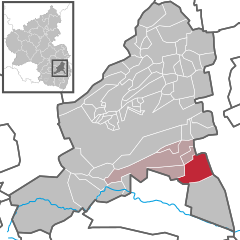Meckenheim, Rhineland-Palatinate
| Meckenheim | ||
|---|---|---|
|
||
| Coordinates: 49°24′13″N 8°14′24″E / 49.40361°N 8.24000°ECoordinates: 49°24′13″N 8°14′24″E / 49.40361°N 8.24000°E | ||
| Country | Germany | |
| State | Rhineland-Palatinate | |
| District | Bad Dürkheim | |
| Municipal assoc. | Deidesheim | |
| Government | ||
| • Mayor | Heiner Dopp (FW) | |
| Area | ||
| • Total | 15.06 km2 (5.81 sq mi) | |
| Elevation | 111 m (364 ft) | |
| Population (2015-12-31) | ||
| • Total | 3,430 | |
| • Density | 230/km2 (590/sq mi) | |
| Time zone | CET/CEST (UTC+1/+2) | |
| Postal codes | 67149 | |
| Dialling codes | 06326 | |
| Vehicle registration | DÜW | |
| Website | www.meckenheim-pfalz.de | |
Meckenheim is an Ortsgemeinde – a municipality belonging to a Verbandsgemeinde, a kind of collective municipality – in the Bad Dürkheim district in Rhineland-Palatinate, Germany.
The municipality lies at the edge of the Weinstraße region (as distinct from the Deutsche Weinstraße – or German Wine Route – itself) and is part of the Rhine-Neckar urban agglomeration. Meckenheim belongs to the Verbandsgemeinde of Deidesheim, whose seat is in the like-named town.
The Frankish village of Meckenheim is believed to have arisen in the 5th century AD. In 768, a first donation from Meckenheim to Lorsch Abbey was documented; further donations to other monasteries followed. In 991, some Meckenheim holdings passed to Duke Otto of Weißenburg (now Wissembourg in nearby Alsace, France). In the 12th century, Saint Giles’s Church (Ägidiuskirche) was built.
In 1287, Meckenheim was bought by Count Palatine Louis II, and thus it thereafter belonged to the Electorate of the Palatinate. In 1459 or 1460, Meckenheim was burnt down by the Counts of Leiningen (Emich VII). With the introduction of the Reformation into the Electorate of the Palatinate, Meckenheim became Protestant. In 1585, Saint Giles’s Church was newly built.
After widespread destruction in the Thirty Years' War, Meckenheim’s inhabitants forsook it in 1641. The Meckenheim church passed to the Catholics in 1707; in 1747 and 1748, the Protestant church was built. During the French Revolutionary Wars in the late 18th century, Meckenheim sustained great damage. As a result of decisions made at the Congress of Vienna, Meckenheim passed in 1816, together with the rest of the Palatinate to the Kingdom of Bavaria.
...
Wikipedia




